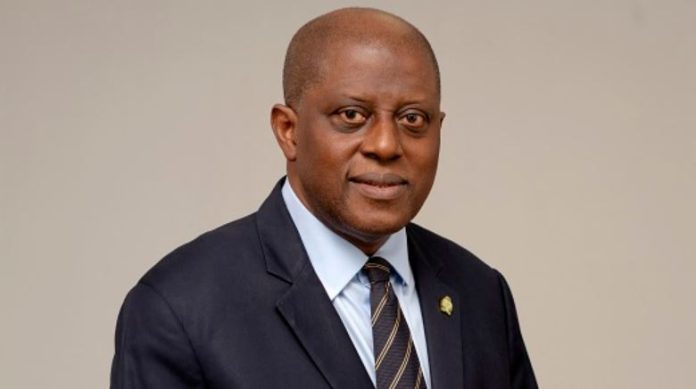

In this report, DAMILOLA AINA examines the various reforms introduced by the Central Bank of Nigeria Governor, Olayemi Cardoso, to reflate the economy
Since assuming office on October 5, 2023, the Governor of the Central Bank of Nigeria, Olayemi Cardoso, has been making various efforts to stabilise the economy and tame accelerating inflation.
Unveiling his policy mandate at the Chartered Institute of Bankers of Nigeria’s 58th Annual Bankers’ Dinner and Grand Finale of the Institute’s 60th anniversary held in Lagos last year, Cardoso reeled out his plans to strengthen investors’ confidence, attract capital inflows, stimulate domestic investment, and ultimately improve the level of external reserves.
One of the challenges that Cardoso promised to address was the issue of foreign exchange backlogs. The CBN was owing investors over $7bn in unmet forex demand, which made the likes of Emirate Airlines suspend their operations in the country.
As of January, the CBN announced that it had cleared $2bn of the forex backlog, and paid $61.64m to foreign airlines operating in the country from their trapped funds.
On Thursday, Cardoso disclosed that the apex bank had cleared verified forex backlogs in all the banks except five of them.
“Basically, what we have done with those is that we have paid as much as we can to the point where we have cleared the backlog of all the banks save five. All the banks’ genuine and verifiable backlogs have been cleared, save five.
“We are confident that we will shortly be in a position where the whole issue of forwards would be behind us. I would say in the next few days we should be in a position where the balance of the five would have been put behind us,” he stated during an investor call facilitated by the Nigerian Exchange Group.
This is beginning to restore investors’ confidence as the forex market is beginning to enjoy relative stability, having suffered increased pressure in January. The naira weakened to an all-time low of 1,574.62/$ at the Nigerian Autonomous Foreign Exchange Market on February 19. But it has recovered and strengthened to 1,561.01/$ as of Tuesday.
The apex bank governor also revealed that the country had attracted $2bn foreign portfolio inflows this year.
Under Cardoso, there has been an alignment in fiscal and monetary policies, which has reduced policy somersault. This alignment is seen as a positive development, as it enhances the effectiveness of policy measures, promotes transparency, and strengthens the overall resilience of Nigeria’s economic framework.
The CBN, as the country’s primary financial regulatory authority, plays a pivotal role in shaping the nation’s economic landscape. In its continuous efforts to maintain monetary stability and foster economic growth, the CBN recently convened its latest Monetary Policy Meeting.
The crucial gathering serves as a platform for the governor and other committee members to deliberate on the current economic conditions, assess key indicators, and make decisions regarding interest rates, liquidity, and other monetary measures.
The outcomes of such meetings have significant implications for Nigeria’s financial markets, influencing borrowing costs, inflation rates, and overall economic stability.
President Bola Tinubu in his letter proposed 12 members, with five CBN officials, including Cardoso, who chairs the MPC, and his four deputy governors -Mohammed Abdullahi, in charge of Economic Policy; Bala Bello, Corporate Services; Emem Usoro, Operations; and Philip Ikeazor, Financial System Stability, as members of the committee.
Other members as approved by the senate include Director-General of the Securities and Exchange Commission, Lamido Yuguda; Jafiya Shehu, who is the permanent secretary of the Ministry of Finance; Murtala Sagagi; Aloysius Uche Ordu; Aku Odinkemelu; Mustapha Akinwumi; and Bamidele Amoo.
The newly formed MPC held its first meeting last week after the appointment of its members was confirmed by the National Assembly on February 22.
Addressing journalists after the two-day meeting, the CBN governor announced that the committee voted to increase the benchmark interest rate by 400 basis points to a record 22.75 per cent from 18.75 per cent, much to the surprise of analysts and financial experts, who had anticipated a little hike in rate.
The MPC also made a bold move to restrict money supply by increasing the Cash Reserve Ratio to 45 per cent from 32.5 per cent, maintaining the liquidity ratio at 30 per cent while the Asymmetric Corridor was also raised to +200/-700.
He said, “All 12 members of the committee decided to further tighten monetary policy by raising the MPR by 400 basis points to 22.75 per cent from 18.75 per cent; adjust the asymmetric corridor around the MPR to +100 to -700 from +100 to -300 basis points.
“The committee also raised the cash reserve ratio from 32.5 per cent to 45 per cent while retaining the liquidity ratio at 30 per cent.”
Justifying the reasons for the hike, Cardoso explained that members considered various scenarios, including whether to hold or hike the policy rate.
He said the MPC concluded that inflation could become more persistent in the medium term and pose more regulatory issues if not well-anchored. Thus, the members voted for a significantly high policy rate hike to drive down the inflation rate substantially.
He mentioned that the meeting extensively discussed various distortions in the foreign exchange market, particularly the impact of speculators exerting upward pressure on the exchange rate, leading to a significant pass-through effect on inflation. The consensus reached involved a substantial policy rate hike aimed at effectively reducing inflation.
He said, “The committee’s decisions were centred on the current inflationary and exchange rate pressures, projected inflation, and rising inflation expectations.
“Members were concerned about the persistent rise in the level of inflation and emphasised the committee’s commitment to reverse the trend as the balance of risk leaned towards rising inflation.
“The committee, however, acknowledged the trade-off between the pursuit of output growth and taming inflation but was convinced that an enduring output expansion is possible only in an environment of low and stable inflation.”
Although the interest rate hike translates into higher prices for the common man as the cost of borrowings will impact the cost of production, which will also impact negatively on the standard of living, the former Lagos Commissioner for Economic Planning and Budget maintained that the ultimate goals of those policies were basically to control inflation, maintain a healthy balance of payment position to safeguard the external value of the national currency and promote adequate and sustainable levels of economic growth and development.
The Nigerian Association of Chambers of Commerce, Industry, Mines and Agriculture, described the recent decision by the MPC to increase the monetary policy rate by 400 basis points to a record 22.75 per cent as a bold and decisive step to tackle the persistent inflationary pressures in the country.
National President of the chamber, Dele Kelvin Oye, in an interview, noted that while such measures were likely to result in higher borrowing costs, which could affect investment and economic growth in the short term, the CBN’s focus on curbing inflation and stabilising the naira was commendable.
“By raising the MPR, the CBN signals its commitment to tightening monetary conditions to rein in inflation, which has been eroding the purchasing power of Nigerians and destabilising the economic environment.
“Inflation in Nigeria has been driven by a combination of factors, including currency depreciation, supply chain disruptions, and elevated food prices. The depreciation of the naira has made imports more expensive, thereby contributing to the inflationary trend.
‘’By increasing the cost of borrowing, the CBN aims to reduce the money supply in the economy, which should help to dampen inflationary pressures over time,” he stated.
According to the NACCIMA president, the adjustment of the asymmetric corridor around the MPR to +100 to -700 basis points provides the CBN with greater flexibility to manage liquidity in the banking system.
He noted that this could help in better steering short-term interest rates in line with the policy rate, which is critical for the transmission of the policy stance to the real economy.
He added, “The rise in the cash reserve ratio from 32.5 per cent to 45 per cent is a further measure to curb excess liquidity in the banking system, which could otherwise fuel inflation. By locking away a larger portion of deposits as reserves, the CBN is effectively reducing the amount of money that banks can lend out, thus slowing down the expansion of credit and money supply.
“While these measures are likely to result in higher borrowing costs, which could affect investment and economic growth in the short term, the CBN’s priority appears to be the stabilisation of prices and the establishment of a foundation for sustainable economic growth.
‘’High inflation is detrimental to investment and long-term economic prosperity, as it creates uncertainty and reduces the real returns on investment.”
Analysts at BancTrust & Co. stated the outcome of the meeting confirmed the move towards inflation targeting and the much-needed liquidity tightening to stem the depreciation of the naira.
“While some of the drivers of headline inflation (29.9 per cent in January 2024) are structural, a tighter monetary policy supporting price discovery in the FX market and an appreciation of the naira could ease imported and domestic food inflation, the latter through lower energy and fertiliser cost,” they said.
Analysts at Cordros Securities also said that the rate hike would have a positive effect on bonds. “Sequentially, we maintain our expectation of an uptick in bond yields over the medium term. Aside from the impact of the higher MPR, our prognosis also takes into account expectations of a sustained imbalance in the supply and demand dynamics, more so that the FGN’s 2024FY borrowing needs remain sizable,” they remarked.
“The recent moves are also positive for the FX market with associated inflows likely to support CBN’s recommencement of dollar sales to the BDCs. We, therefore, see latitude for improvement in FX liquidity and potential naira gains in the near to medium term,” CardinalStone Research analysts added.
In their view, the strong hawkish actions of the CBN were likely to fuel higher yields in the fixed-income market in the near term.
“For the equities market, the higher interest rate is less compelling for valuation and could further stoke bearish sentiment in the market.
“Nevertheless, sell-offs may present decent entry opportunities in fundamentally sound stocks such as those with positive interest sensitivities to their margins, robust cash and low leverage,” they argued.
Cardoso has initiated policies to strengthen the local currency and reduce inflation. For instance, the CBN recently stopped international money transfer operators from paying dollars to receivers in the country.
“This is to inform you that on January 31st, 2024, the Central Bank of Nigeria (CBN) issued a Circular which states that all in-bound money transfers will now be paid in the following ways,” the notice reads.
“All transfers will be received only in Naira, either directly into the beneficiary’s bank account or received in cash.
“Transfers above the naira equivalent of $200 will be credited to the beneficiary’s bank account, while cash payment equivalent for an amount below $200 will require the following means of Identification: a. International Passport; b. Driver’s License; c. National Identity Card; d. INEC Permanent Voters Card (PVC),” the apex bank said in a statement on February 13.
The apex bank had also partnered with the Economic and Financial Crime Commission to arrest speculators and money launderers.
On February 19, the EFCC arrested over 50 Bureau de Change operators in Abuja for different infractions as part of efforts to stabilise the naira.
Join Television Nigerian Whatsapp Now
Join Television Nigerian Facebook Now
Join Television Nigerian Twitter Now
Join Television Nigerian YouTUbe Now





